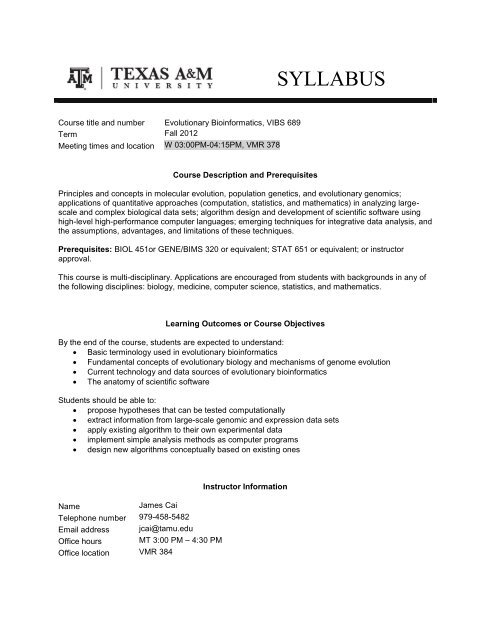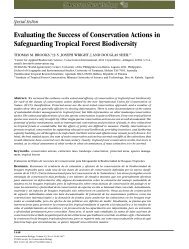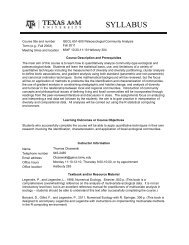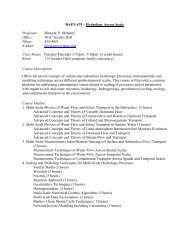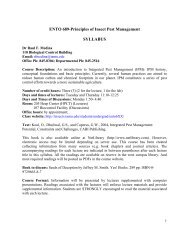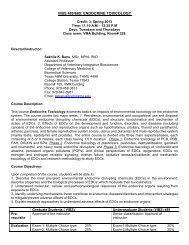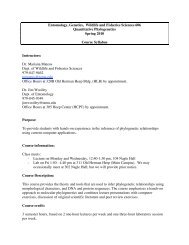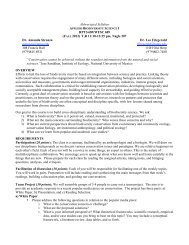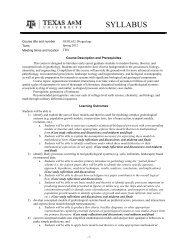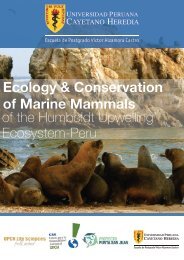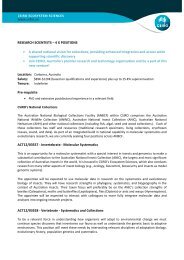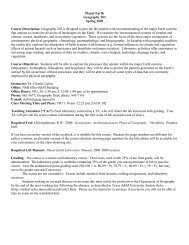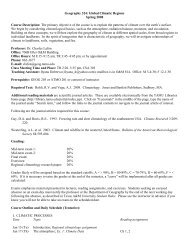syllabus - Ecology and Evolutionary Biology - Texas A&M University
syllabus - Ecology and Evolutionary Biology - Texas A&M University
syllabus - Ecology and Evolutionary Biology - Texas A&M University
You also want an ePaper? Increase the reach of your titles
YUMPU automatically turns print PDFs into web optimized ePapers that Google loves.
Course title <strong>and</strong> number <strong>Evolutionary</strong> Bioinformatics, VIBS 689<br />
Term<br />
Fall 2012<br />
Meeting times <strong>and</strong> location W 03:00PM-04:15PM, VMR 378<br />
Course Description <strong>and</strong> Prerequisites<br />
SYLLABUS<br />
Principles <strong>and</strong> concepts in molecular evolution, population genetics, <strong>and</strong> evolutionary genomics;<br />
applications of quantitative approaches (computation, statistics, <strong>and</strong> mathematics) in analyzing largescale<br />
<strong>and</strong> complex biological data sets; algorithm design <strong>and</strong> development of scientific software using<br />
high-level high-performance computer languages; emerging techniques for integrative data analysis, <strong>and</strong><br />
the assumptions, advantages, <strong>and</strong> limitations of these techniques.<br />
Prerequisites: BIOL 451or GENE/BIMS 320 or equivalent; STAT 651 or equivalent; or instructor<br />
approval.<br />
This course is multi-disciplinary. Applications are encouraged from students with backgrounds in any of<br />
the following disciplines: biology, medicine, computer science, statistics, <strong>and</strong> mathematics.<br />
Learning Outcomes or Course Objectives<br />
By the end of the course, students are expected to underst<strong>and</strong>:<br />
Basic terminology used in evolutionary bioinformatics<br />
Fundamental concepts of evolutionary biology <strong>and</strong> mechanisms of genome evolution<br />
Current technology <strong>and</strong> data sources of evolutionary bioinformatics<br />
The anatomy of scientific software<br />
Students should be able to:<br />
propose hypotheses that can be tested computationally<br />
extract information from large-scale genomic <strong>and</strong> expression data sets<br />
apply existing algorithm to their own experimental data<br />
implement simple analysis methods as computer programs<br />
design new algorithms conceptually based on existing ones<br />
Name<br />
Telephone number<br />
Email address<br />
Office hours<br />
Office location<br />
James Cai<br />
979-458-5482<br />
jcai@tamu.edu<br />
MT 3:00 PM – 4:30 PM<br />
VMR 384<br />
Instructor Information
Class Notes <strong>and</strong> Resource Material<br />
Class notes: Distributed in class. There is no required textbook.<br />
Software: Matlab for Windows/Mac/Linux (the student version is available for purchase at<br />
http://www.mathworks.com/store/platformReleaseStuSubmit.do), or having a user account of the<br />
TAMU Supercomputing Facility (http://sc.tamu.edu).<br />
Additional readings: You are responsible for additional readings that will be announced in<br />
class. There will be one reading from the primary literature each week which will be required for<br />
participation in case study discussion in class.<br />
Attendance <strong>and</strong> Grading Policies<br />
The <strong>University</strong> views class attendance as the responsibility of an individual student. Attendance is<br />
essential to complete the course successfully. <strong>University</strong> rules related to excused <strong>and</strong> unexcused<br />
absences are located on-line at http://student-rules.tamu.edu/rule07.<br />
Grading scale: A = 90%-100%, B = 80%-89%, C = 70%-79%, D = 60%-69%, F < 60%<br />
Students will be evaluated based on:<br />
a) Homework assignments (40%)<br />
b) Student presentation (40%)<br />
c) Final exam – December 2012 (20%)<br />
Late work will be accepted only if there is an approved absence, http://student-rules.tamu.edu<br />
Course Topics, Calendar of Activities<br />
Week Topic Required Reading<br />
1<br />
Essential biology, statistics, <strong>and</strong> introduction of<br />
programming techniques<br />
Class notes<br />
2<br />
Comparative genomics <strong>and</strong> laws of genome<br />
evolution<br />
Class notes<br />
3<br />
Molecular evolution <strong>and</strong> phylogenetic<br />
reconstruction<br />
Class notes<br />
4<br />
<strong>Evolutionary</strong> change in nucleotide sequences<br />
<strong>and</strong> molecular basis of adaptation<br />
Class notes<br />
5<br />
Genetic drift, coalescent theory, <strong>and</strong> forwardtime<br />
simulation<br />
Class notes<br />
6 Recombination <strong>and</strong> linkage disequilibrium Class notes<br />
7 Selective sweep <strong>and</strong> hitchhiking mapping Class notes<br />
8<br />
Human evolution, genetic diversity, <strong>and</strong><br />
personalized medicine<br />
Class notes<br />
9<br />
Parallel computing via multicore processor,<br />
GPU, <strong>and</strong> computer cluster<br />
Class notes<br />
10<br />
Quantitative genetics: QTL, association<br />
mapping, <strong>and</strong> GWAS<br />
Class notes<br />
11 Evolution of gene expression Class notes<br />
12<br />
Systems biology <strong>and</strong> analysis of biological<br />
networks<br />
Class notes<br />
13 Next generation sequencing data analysis Class notes<br />
14 Student presentations<br />
Americans with Disabilities Act (ADA)
The Americans with Disabilities Act (ADA) is a federal anti-discrimination statute that provides<br />
comprehensive civil rights protection for persons with disabilities. Among other things, this legislation<br />
requires that all students with disabilities be guaranteed a learning environment that provides for<br />
reasonable accommodation of their disabilities. If you believe you have a disability requiring an<br />
accommodation, please contact Disability Services, in Cain Hall, Room B118, or call 845-1637. For<br />
additional information visit http://disability.tamu.edu<br />
Academic Integrity<br />
For additional information please visit: http://www.tamu.edu/aggiehonor<br />
“An Aggie does not lie, cheat, or steal, or tolerate those who do.”<br />
Upon accepting admission to <strong>Texas</strong> A&M <strong>University</strong>, a student immediately assumes a commitment to<br />
uphold the Honor Code, to accept responsibility for learning, <strong>and</strong> to follow the philosophy <strong>and</strong> rules of<br />
the Honor System. Students will be required to state their commitment on examinations, research<br />
papers, <strong>and</strong> other academic work. Ignorance of the rules does not exclude any member of the TAMU<br />
community from the requirements or the processes of the Honor System.


